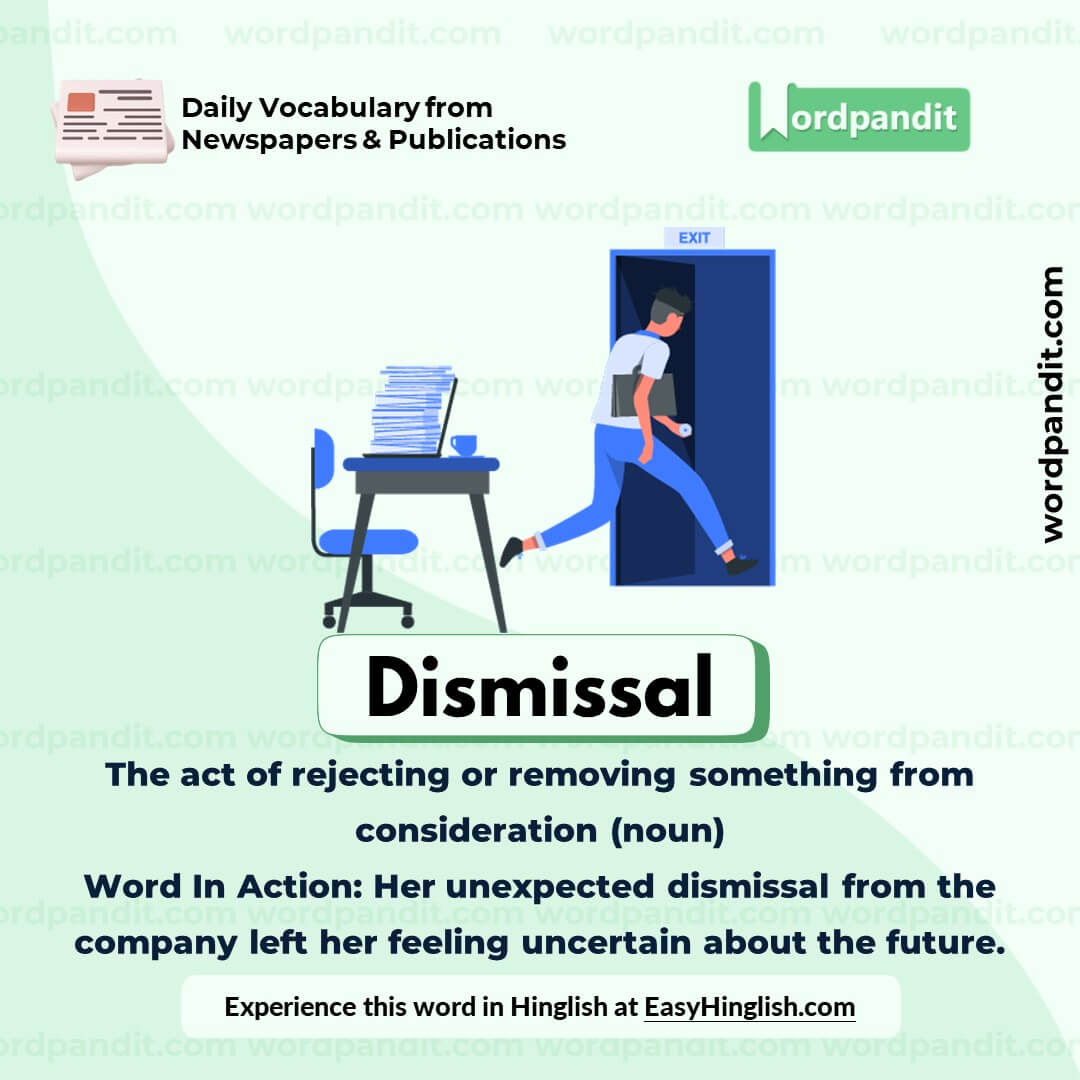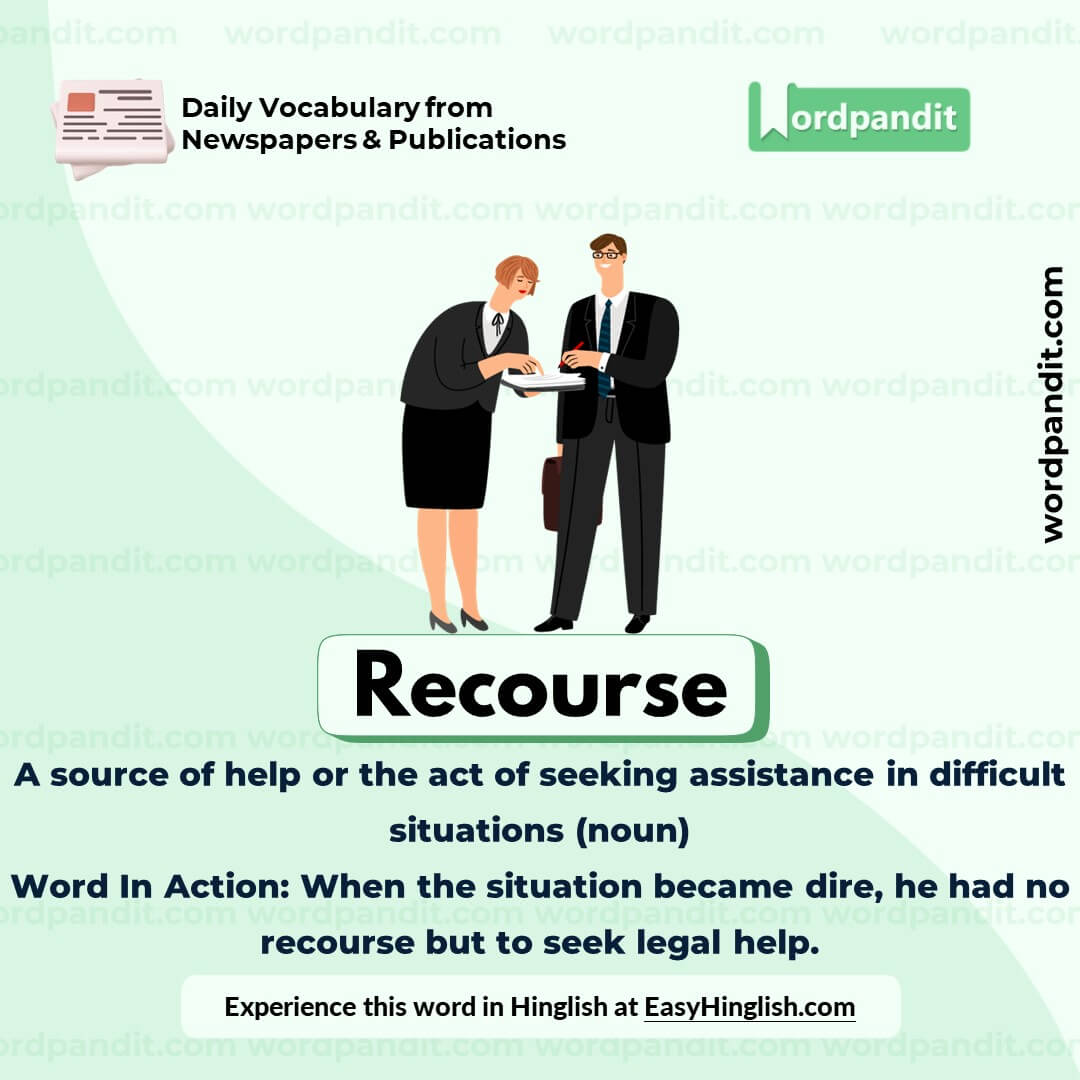Daily Vocabulary from Indian Newspapers and Publications
Welcome to Wordpandit’s Indian Vocabulary Hub
At Wordpandit, we understand the importance of staying rooted in the local context while expanding your language skills. This section focuses on enriching your vocabulary with words and phrases drawn from India’s leading newspapers and publications, ensuring you're learning vocabulary that is practical, relevant, and uniquely Indian.
Why Indian Sources Matter
We believe that the best way to master any language is by immersing yourself in local content. That’s why we carefully curate vocabulary from top Indian publications, including:
- The Hindu
- The Times of India
- The Economic Times
- Hindustan Times
- Live Mint
- The Indian Express
- And many others...
Stay Updated, Stay Relevant
With daily updates from Indian news sources, you’ll be consistently learning words that reflect the trends and shifts in Indian society and culture. Our focus is to provide vocabulary that enhances your understanding of the language in an Indian context.
How Wordpandit Supports Your Goals
Whether you’re preparing for exams, aiming to improve your professional communication, or simply want to stay connected with the latest Indian vocabulary, Wordpandit is here to guide you every step of the way.
Learn with a Practical Approach
Our interactive learning methodology includes real-world examples, engaging activities, and context-specific usage to ensure that every word becomes part of your active vocabulary.
Dive into Indian Vocabulary Today!
Why Choose Wordpandit?
Practical Learning: Focus on words you'll actually encounter in real-world reading, enhancing your comprehension and communication skills.
Diverse Content: From current affairs to scientific breakthroughs, our varied sources expose you to vocabulary across multiple domains.
Effortless Integration: Make Wordpandit a part of your daily routine. Just a few minutes each day can significantly boost your lexicon over time.
Your Path to Vocabulary Mastery
- Visit our Daily Vocabulary section regularly
- Explore new words and their usage in context
- Practice incorporating these words into your own writing and speech
- Track your progress as your vocabulary expands
Start Your Journey Today
Embark on your vocabulary enhancement journey with Wordpandit. By consistently engaging with our daily posts, you'll build a robust vocabulary that serves you well in academic, professional, and personal contexts.
Remember, a word a day keeps linguistic limitations at bay. Make Wordpandit your daily companion in the quest for vocabulary excellence!
WORD-1: Brexit
Context:
"The recent rise of populism that has swept across Western countries with Trump, Brexit, and the election of populists in Hungary and Italy, among various other factors, is thus of great concern if we care about global welfare." - The Telegraph India
Explanatory Paragraph:
Brexit refers to the withdrawal of the United Kingdom from the European Union, a major political and economic event. The term is a blend of "Britain" and "exit," highlighting the UK's decision to leave the EU following a 2016 referendum. The decision was influenced by debates over sovereignty, immigration, and economic policies, and its effects continue to shape global discussions on international cooperation and populism.
Meaning: The withdrawal of the United Kingdom from the European Union. (Noun)
Pronunciation: Brek-sit
Difficulty Level: ⭐⭐⭐ Intermediate
Etymology: Coined in 2012 from a combination of "Britain" and "exit," modeled after "Grexit," which referred to a potential Greek exit from the EU.
Synonyms & Antonyms:
Synonyms: UK withdrawal, EU exit
Antonyms: EU membership, European integration
Usage Examples:
- The economic repercussions of Brexit are still being analyzed by economists worldwide.
- Brexit negotiations revealed deep divisions within British society and politics.
- The term "Brexit" has become a symbol of populist movements across Europe.
- Many companies relocated their headquarters from London to Europe after Brexit.
Cultural Reference:
"Brexit is like trying to remove the egg from an omelette." - A popular metaphor describing the complexity of Brexit negotiations.
Think About It:
How has Brexit influenced the way other countries approach global alliances and trade agreements?
Quick Activity:
Write a short essay discussing whether Brexit represents a step forward or backward for globalization.
Memory Tip:
Think of "Brexit" as "Britain exits" to remember its meaning.
Real-World Application:
Understanding Brexit is essential for grasping modern geopolitical trends, as it affects international trade, immigration policies, and the dynamics of regional cooperation worldwide.
WORD-2: Litigants
Context:
"An intervention application, the Anjuman Intezamia Masjid Varanasi has sought the dismissal of a batch of petitions moved by Hindu litigants that have challenged the constitutional validity of the Place of Worship (Special Provisions) Act, 1991." - The Telegraph India
Explanatory Paragraph:
The word "litigants" refers to individuals, groups, or entities involved in a lawsuit, either as plaintiffs (those who bring the case) or defendants (those being sued). They are key participants in the legal process, presenting their arguments and evidence before a court to resolve a dispute or enforce a right.
Meaning: A person or party engaged in a lawsuit (noun).
Pronunciation: LIT-ih-guhnts
Difficulty Level: ⭐⭐⭐ Intermediate
Etymology: From Latin "litigantem," meaning "to dispute" or "to go to law," derived from "litigare," which combines "lis" (dispute) and "agere" (to drive or act).
Synonyms & Antonyms:
Synonyms: plaintiff, defendant, appellant, complainant
Antonyms: non-participant, mediator
Usage Examples:
- The litigants presented their arguments to the judge in a detailed hearing.
- Both litigants agreed to settle the dispute out of court to save time and money.
- The case was delayed because one of the litigants failed to appear for the hearing.
- Litigants often hire legal counsel to navigate complex court procedures.
Cultural Reference:
"Litigants play a crucial role in the famous U.S. Supreme Court case Brown v. Board of Education, where individuals challenged racial segregation, transforming the American educational system." - Reference from U.S. legal history.
Think About It:
What measures can be taken to ensure that litigants from marginalized communities receive fair and equal access to justice?
Quick Activity:
Research a landmark legal case and identify the litigants involved. Discuss their roles and the outcome of the case.
Memory Tip:
Think of "litigants" as those "litigating" or actively participating in legal battles in a courtroom.
Real-World Application:
The term "litigants" is frequently used in legal documents, news reports, and court proceedings. Understanding this term helps in grasping the dynamics of legal disputes and the roles of the parties involved.
WORD-3: Dismissal
Context:
"An intervention application, the Anjuman Intezamia Masjid Varanasi has sought the dismissal of a batch of petitions moved by Hindu litigants that have challenged the constitutional validity of the Place of Worship (Special Provisions) Act, 1991." - The Telegraph India
Explanatory Paragraph:
"Dismissal" refers to the act of rejecting, terminating, or removing a case, person, or idea from consideration. In legal terms, it denotes the decision by a court to reject a case or claim, often on procedural grounds or due to a lack of merit. Outside the legal domain, it may refer to the termination of employment or the disregard of an idea or suggestion.
Meaning: The act of rejecting or removing something from consideration (noun).
Pronunciation: dis-MISS-ul
Difficulty Level: ⭐⭐ Beginner
Etymology: Derived from the Latin "dismissus," past participle of "dimittere," meaning "to send away," combining "dis" (apart) and "mittere" (to send).
Synonyms & Antonyms:
Synonyms: rejection, termination, removal, discharge
Antonyms: acceptance, approval, reinstatement
Usage Examples:
- The court's dismissal of the case left the plaintiffs disheartened.
- Her dismissal from the company was due to repeated policy violations.
- The manager’s quick dismissal of the suggestion discouraged creative thinking.
- The lawyer requested the dismissal of the charges based on insufficient evidence.
Cultural Reference:
"The dismissal of Rosa Parks from her bus seat in 1955 became a pivotal moment in the American Civil Rights Movement, highlighting the injustices of segregation laws." - Reference from historical events.
Think About It:
How can the dismissal of valid concerns or ideas impact innovation and progress in an organization?
Quick Activity:
List three scenarios where "dismissal" might occur (e.g., legal, workplace, personal). Discuss how the term applies in each context.
Memory Tip:
Link "dismissal" with "dismiss," as in "sending away" or "closing a case," to remember its core meaning of rejection or termination.
Real-World Application:
"Dismissal" is a key term in legal and professional settings. In courts, it is used to indicate the rejection of a case, while in workplaces, it often refers to terminating an employee’s contract. Understanding its use is crucial in comprehending legal judgments and HR policies.
WORD-4: Solace
Context:
"For any person who seeks solace or recourse against the actions of any number of ancient rulers, the law is not the answer." - The Telegraph India
Explanatory Paragraph:
"Solace" refers to comfort, peace, or consolation that someone seeks during times of distress, sadness, or difficulty. It often implies emotional support or relief from suffering, whether found in a person, place, or activity.
Meaning: Comfort or consolation in a time of distress (noun).
Pronunciation: SO-lis
Difficulty Level: ⭐⭐ Beginner
Etymology: From the Latin "solacium," meaning "comfort" or "relief," derived from "solari" (to console).
Synonyms & Antonyms:
Synonyms: comfort, relief, consolation, support
Antonyms: distress, anguish, torment
Usage Examples:
- After the loss of his job, he found solace in spending time with his family.
- The serene beauty of the mountains provided her with solace during difficult times.
- He sought solace in music, using it as a refuge from life's challenges.
- The book offered solace to readers dealing with grief and loss.
Cultural Reference:
"Solace is often a central theme in literature, such as in Wordsworth’s poetry, where nature is depicted as a source of comfort and healing for the human soul." - Reference from Romantic literature.
Think About It:
Why do people often turn to art, nature, or spirituality for solace during times of hardship?
Quick Activity:
Write a short paragraph about a time when you found solace in an unexpected place or activity. Reflect on why it was comforting.
Memory Tip:
Link "solace" to "soul," as it is often about finding peace and comfort that soothes the soul.
Real-World Application:
"Solace" is widely used in everyday conversation and literature to describe the emotional relief or comfort people seek. For instance, counselors and therapists provide solace to individuals dealing with personal challenges, while hobbies and nature often serve as personal refuges for solace.
WORD-5: Recourse
Context:
"For any person who seeks solace or recourse against the actions of any number of ancient rulers, the law is not the answer." - The Telegraph India
Explanatory Paragraph:
"Recourse" refers to the act of seeking help, protection, or a solution to a problem, often by turning to a person, authority, or method that can provide assistance. It implies reliance on something or someone to address a difficulty or secure a remedy.
Meaning: A source of help or the act of seeking assistance in difficult situations (noun).
Pronunciation: ree-KORS
Difficulty Level: ⭐⭐⭐ Intermediate
Etymology: From the Latin "recursus," meaning "to run back," derived from "re-" (again) and "currere" (to run).
Synonyms & Antonyms:
Synonyms: remedy, option, resource, appeal
Antonyms: neglect, avoidance, inaction
Usage Examples:
- The villagers had no recourse but to seek assistance from the local authorities.
- When faced with injustice, legal recourse is often the most reliable option.
- She turned to her family as a recourse during times of financial hardship.
- Without proper documentation, they were left without any recourse to challenge the decision.
Cultural Reference:
"Recourse is a recurring theme in international relations, as nations often seek recourse to international courts like the ICJ to resolve disputes." - Reference from global legal systems.
Think About It:
What factors determine whether a person has access to meaningful recourse in a legal or social system?
Quick Activity:
Identify a situation where you or someone you know sought recourse for a problem. Reflect on the effectiveness of the solution they pursued.
Memory Tip:
Think of "recourse" as "running back" to something or someone for help, highlighting its origin from "re-" and "currere."
Real-World Application:
"Recourse" is a critical term in law, finance, and conflict resolution. For instance, in legal contexts, people seek recourse through courts to resolve disputes. In finance, recourse loans allow lenders to claim additional assets if a borrower defaults. Understanding this term aids in navigating these systems effectively.
















